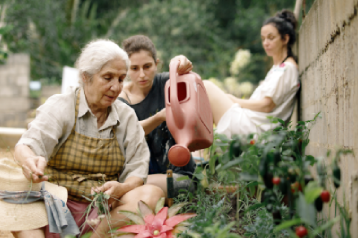

Original name: Malu
English name: Malu
Year: 2023
Run time: 103 minutes
Language: Brazilian Portuguese
Type (Colour/ Black & white): Colour
Country: Brazil
Director: Pedro Freire
Producer: Tatiana Leite, Roberto Berliner, Sabrina Garcia, Leo Ribeiro
Cast: Yara de Novaes, Juliana Carneiro da Cunha, Carol Duarte, Átila Bee
Screenplay: Pedro Freire
Cinematographer: Mauro Pinheiro Jr.
Editor: Marilia Moraes
Sound Designer: Daniel Turini
Music Composer: Jonas Sá
Production Designer: Elsa Romero
Production Company: Bubbles Project and TvZero
World Sales: Pluto Film

Pedro Freire is a film, theatre and TV director, writer and producer. Graduated as Film Director at EICTV and in Theatre at CAL. In 2016 his short film Se por acaso, done under the artistic supervision of Abbas Kiarostami, premiered at Locarno Film Festival. He worked as screenwriter for Ruy Guerra, assistant director to Karim Aïnouz and collaborated as director of actors or casting director for filmmakers such as Jonathan Nossiter, Marcelo Gomes, Sandra Kogut, Sérgio Machado and Cao Guimarães, in a total of 16 feature films, as well as assistant director for theatre directors Enrique Diaz and Bia Lessa. He wrote the screenplay for the feature Hopefuls (Ives Rosenfeld), winner of the Carte Blanche prize at Locarno 2014.
Rio de Janeiro, 1997. Malu, a 50-year-old unemployed and bipolar actress, lives in a precarious house in a favela close to the sea. Dreaming of her glorious past in the theater, she finds herself obliged to house her mother, Lili, a deeply conservative old lady, who has nowhere else to live. In solitude, Malu tries to reconnect with Lili, but it doesn't work and after a complicated episode Malu expels Lili for her house. A few years later, living in complete loneliness and abandonment, Malu develops severe neurological conditions, and Joana finally returns to care for her mother. They discover that Malu has little time left to live, her brain is deteriorating by the day. Joana decides to take Malu to São Paulo, to look after her during the last months of her life. The imminence of death brings an unexpected lightness to their mother-daughter relationship. On the road to São Paulo, already reconciled with her daughter, talking about Brazil's fragile and young democracy.